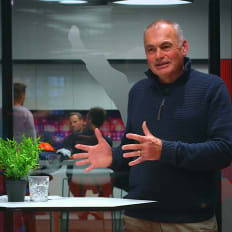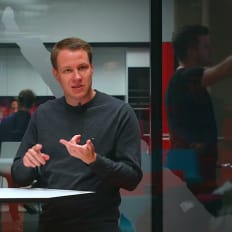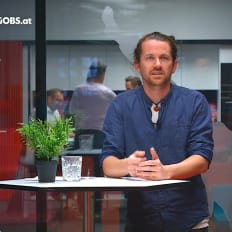
ECO-Soft GmbH
Ricardo Reindl, Full Stack Developer bei ECO-Soft
Description
Ricardo Reindl von ECO-Soft erzählt in seinem Interview von den spielerischen Anfängen während der Schulzeit und über seinen weiteren Werdegang bis zum Full Stack Development – und was das Wichtigste für Neueinsteiger ist.
By playing the video, you agree to data transfer to YouTube and acknowledge the privacy policy.
Video Summary
In "Ricardo Reindl, Full Stack Developer bei ECO-Soft," Speaker Ricardo Reindl shares how tinkering with Minecraft servers and curiosity about how things work led from a teacher-training program in Psychology and Informatics to an apprenticeship at ECO-Soft after a difficult pandemic study period—learning that programming isn’t magic. At ECO-Soft he contributes to web and Windows applications; most recently he built a C# Windows service that periodically pulls truck transport geodata via a partner’s REST/JSON API and imports it into their system, deepening his API expertise. He advises starting hands-on with small projects, cultivating passion and perseverance, and finding your own path, illustrating how a young team and real projects at ECO-Soft enable practical growth.
From Minecraft Servers to API Craftsmanship: Ricardo Reindl (ECO-Soft GmbH) on Practical Learning, C#, REST, and Breaking into Full-Stack Development
Why this story matters to engineers
In our DevJobs.at session “Ricardo Reindl, Full Stack Developer bei ECO-Soft,” the speaker charts a refreshingly grounded path into software: from configuring Minecraft servers and dabbling in video/image editing, to enrolling in a teacher training program in psychology and computer science, and ultimately building production software at ECO-Soft GmbH. His journey shows how curiosity, hands-on practice, and real projects compound into professional skills—no magic shortcuts, no one-size-fits-all plan.
Ricardo dissolves a stubborn myth: “Programming is not magic; it can be learned.” He links that realization to a practical mantra we took from the session: start by doing, begin small, keep going. The milestones he shares—from early server configuration to an API-centered project, culminating in a C# Windows service—draw a clear, replicable map for aspiring developers who want to gain momentum and maturity through practice.
Early sparks: play, curiosity, and first systems
Ricardo’s relationship with tech started early. In lower secondary school he spent hours at the computer—not only as a gamer but as someone keen to get things working. With a friend, he configured Minecraft servers just so they could play together in the same world. That experience goes beyond leisure; it’s a first encounter with distributed systems, configuration, network quirks, and the stubborn “why isn’t this working yet?”
He also experimented with video editing and image processing—creative tooling that develops a feel for workflows, formats, processing pipelines, and failure points. Still, he kept programming at arm’s length. Ricardo admits he long thought coding was reserved for “highly gifted” people—and school hardly gave him real exposure.
What persisted, however, was his “How does this actually work?” impulse—about games, about the apps we use daily. That curiosity to understand systems, not just consume them, planted seeds for later.
University beginnings: teacher training and the demystification of code
After finishing school, Ricardo started a teacher training program in psychology and computer science. It’s an intriguing blend—combining a technical discipline with how humans learn and think. It’s also when he discovered a crucial truth: coding is teachable. No sorcery, just concepts, patterns, and consistent practice.
“Programming is not magic; it can be learned.”
He enjoyed programming—but the studying experience, during a challenging pandemic period, was a different story. COVID made learning and life harder for many students, including Ricardo. So he pivoted to a route where practice sets the pace: an apprenticeship at ECO-Soft GmbH.
Practice sets the tempo: an apprenticeship at ECO-Soft GmbH
At ECO-Soft, the focus shifted decisively from theory to implementation. Ricardo told us the company works on many different projects, which meant variety for him as well: web development, Windows application development, and—most recently—a deep dive into APIs.
This breadth is invaluable for early-career engineers. It forces you to switch contexts, see across stacks, and connect frontend, backend, and form factors. From the session we took away that ECO-Soft gives him space to “work independently or together with a young team on real projects,” building skills steadily and credibly through delivery.
API focus: REST, JSON, and a Windows service in C#
Right now, Ricardo is investing most of his time in APIs—interfaces that let separate systems communicate and exchange data. He explained a concrete project:
- A partner company provides truck transport data.
- When a truck moves from A to B, it emits geodata.
- ECO-Soft retrieves this through a programming interface.
- Ricardo’s task: write a Windows service that regularly requests these transport data points and imports them into ECO-Soft’s system, where they get processed further.
Technologically, that means REST, JSON, and C#. It’s a balanced, real-world stack that teaches a lot fast:
- REST gives structure to resources and actions—readable, standard-friendly, and testable.
- JSON is compact and human-readable, easy to parse on both backend and frontend.
- A Windows service runs in the background reliably and on schedule—perfect for polling an external API at fixed intervals and keeping internal systems in sync.
Ricardo underscored how much he learned about APIs through this project—specifically REST, JSON, and C#. It’s an ideal laboratory: understand data, ensure robustness, handle errors, choose sensible intervals and timeouts, and land records cleanly so downstream processes can work with them.
Why this kind of work accelerates learning
From an editorial perspective, assignments like this are learners’ catnip: system-level thinking without over-abstracting.
- Domain awareness: What are transport data? Which geodata fields matter? Which ones are critical downstream?
- Interface fluency: How is authentication handled? How are versions managed? Do the JSON schemas match our expectations?
- Operational basics: What’s the right polling interval? Which timeouts are appropriate? What happens when the partner API is down?
- Data hygiene: How are new records inserted, duplicates recognized, updates applied?
Ricardo didn’t enumerate all these subtopics, yet the contours—scheduled retrieval, a Windows service, REST/JSON, ingestion into the internal system—paint a picture of a production-caliber task. Solving such problems builds both tooling knowledge and a mindset: defensive, reproducible, and evolvable.
From play to production: the throughline is “doing”
A strong pattern runs through Ricardo’s story: start, try, iterate. He advises against getting stuck in docs and recommends beginning with a small project. His entry points are deliberately approachable:
“In my opinion, it’s very important to start practically … just start with a small project.”
- If you love a game, explore its modding community. Extending an existing system develops reading, extending, and debugging skills.
- YouTube offers countless small projects—a mini-game, a personal website—that you can implement quickly for early wins.
The logic is sound: each mini-project broadens your repertoire. You learn how to isolate bugs, spot recurring patterns, and understand component interactions. In our conversations with newcomers, we see this experience-based curve consistently build the confidence needed for tackling harder tasks.
Mindset over dogma: passion, persistence, and enjoying abstract thought
Ricardo names three traits he finds essential for aspiring programmers:
- Passion for programming—or at least a willingness to discover and cultivate it.
- Perseverance—problems are inevitable; solving them is the job.
- Enjoyment of logical and abstract thinking—the mental training core of software development.
This matches what we hear from teams repeatedly: domain knowledge matters, but mindset is what carries you through the rough patches.
“You will repeatedly run into problems that you simply have to solve.”
No single prescribed path: choose the environment that fits
Ricardo puts it succinctly:
“There is no fixed path in IT.”
For him, ECO-Soft GmbH was the right decision because it lets him work independently or with a young team on real projects, building knowledge and experience incrementally. It’s a blueprint with many possible routes: university, apprenticeship, bootcamp, self-study—the constant is a practice-rich environment where you can own meaningful tasks.
Practical takeaways for developers
From “Ricardo Reindl, Full Stack Developer bei ECO-Soft” we distilled the following action points:
- Start small, learn fast:
- Pick a mini-project from your world: a tiny game, a simple website, a small automation.
- Set a tight scope (1–2 weeks) to build momentum.
- Read docs purposefully—but lock in concepts by shipping small prototypes.
- Mod instead of just playing:
- If you game, try modding. Learn to read, extend, and debug an existing system.
- Use APIs as a learning vehicle:
- Work with an open API (weather, public datasets, simple feeds).
- Build a small service that polls regularly and stores results. You’ll practice REST, JSON, error handling, and data persistence.
- Embrace technical breadth:
- Sample frontend, backend, and—like Ricardo—desktop/Windows apps. Broad exposure fosters system thinking.
- Tend your mindset:
- Train perseverance: friction is part of the work.
- Find joy in logical and abstract reasoning—it will keep you engaged.
A replicable mini-project: think “Windows service,” no code required
Without sharing code, you can model Ricardo’s task as a learning project:
- Choose an API that returns JSON (e.g., open transportation or weather data).
- Implement a background process that:
- issues a REST GET every X minutes,
- validates the JSON response and extracts key fields,
- stores results in a file or database,
- logs errors and retries sensibly on failures.
- Add a small dashboard (web or desktop) that visualizes stored data.
This mirrors Ricardo’s real assignment: scheduled retrieval, JSON parsing, persistence, and downstream consumption. It forces disciplined engineering and yields visible outcomes.
Why REST/JSON and C# make a compelling trio
- REST is widely adopted, well documented, and easy to inspect with simple tools. It instills clear thinking about resources, paths, and state.
- JSON is lightweight and human-readable—great for spotting issues and understanding data models.
- C# is a modern, full-featured language with a strong ecosystem for Windows services and beyond—well suited to Ricardo’s project context.
Mastering this combination builds a robust base for full-stack practice: frontends often consume REST/JSON, backends serve it, and services orchestrate data flows in the background.
What teams can learn from this path
There’s an organizational lesson too: steep learning curves happen where real responsibility meets supported autonomy. A junior engineer building a production-adjacent service will learn faster than months of pure theory—especially with a team providing code reviews, architectural guidance, and prioritization. Ricardo’s experience at ECO-Soft GmbH illustrates how powerful real projects are as learning environments.
Quotes that stick
- “Programming is not magic; it can be learned.”
- “In my opinion, it’s very important to start practically.”
- “There is no fixed path in IT.”
These lines capture the essence: demystify technology, begin by doing, and commit to your own route.
Conclusion: A pragmatic blueprint with real-world traction
In “Ricardo Reindl, Full Stack Developer bei ECO-Soft,” Ricardo shows how curiosity, practice, and persistence open the door to software careers. From Minecraft servers and a teacher training program to an apprenticeship at ECO-Soft GmbH, his story carries a consistent thread: become effective through real work, get feedback from actual projects, and let your capabilities grow organically.
His current focus—REST APIs, JSON, C#, and a Windows service that routinely fetches transport/geodata and imports it into the company’s system—stands as a model for assignments that teach fast and stick. Add his clear stance—start small, persevere, enjoy the mental craft—and you get a no-nonsense approach that travels well.
From our editorial vantage point, it’s motivating precisely because it stays concrete. No hype, no shortcuts—just a real path with tangible steps. If you’re wondering how to start or re-start in software, consider the lesson here: start practically, learn on real problems, and choose environments like ECO-Soft GmbH where you can own meaningful work. The rest—whether REST, JSON, or C#—is learnable.
More Tech Lead Stories
ECO-Soft GmbH Hans Burgstaller, Full Stack Developer bei ECO-Soft
Hans Burgstaller von ECO-Soft gibt im Interview Einblicke in die Entstehung des Unternehmens, das heutige Development Team, die Technologien die dort zum Einsatz kommen und wie das Recruiting im Unternehmen gestaltet ist.
Watch nowECO-Soft GmbH Florian Knoll, Full Stack Developer bei ECO-Soft
Florian Knoll von ECO-Soft beschreibt im Interview das Team des Unternehmens, den Ablauf des Bewerbungsprozesses und gibt Einblicke in die technologischen Challenges.
Watch now




